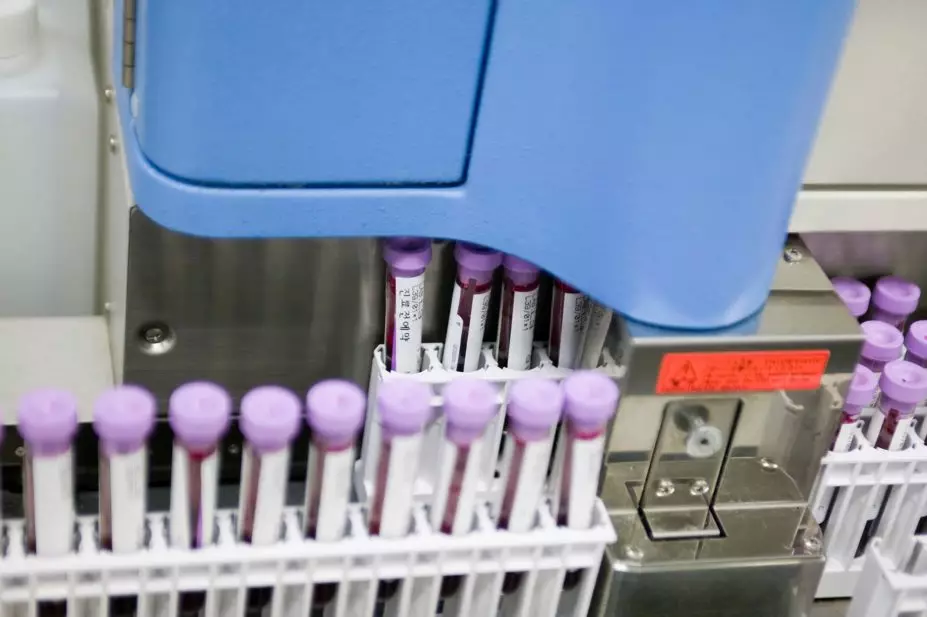
Newscast/UNIVERSAL IMAGES GROUP/SCIENCE PHOTO LIBRARY
DPD (dihydropyrimidine dehydrogenase) is an enzyme involved in the metabolic pathway of 5-fluorouracil, capecitabine and tegafur, which are chemotherapy drugs mainly used to treat solid tumours. Although treatment with these fluoropyrimidines is generally well tolerated, the prevalence of patients who are DPD deficient, and therefore are at risk of severe drug reactions, is estimated to be as high as 5–8%, but this varies in different populations. This means patients are unable to properly metabolise these drugs and can end up with prolonged morbidity and, in some cases, mortality. The increased risk of serious and fatal toxicities includes stomatitis, severe diarrhoea, mucosal inflammation, neutropenia and neurotoxicity.
In April 2020, the European Medicines Agency (EMA) recommended that patients should be tested for a lack of the DPD enzyme before starting cancer treatment with dipyrimidines. Not long after this recommendation, the Medicines and Healthcare products Regulatory Agency (MHRA) released a safety alert outlining the need for DPD deficiency testing.
The DPD enzyme is coded for by the DPYD gene. To date, four genetic variants in this gene are known to cause deficiency, and the DPD deficiency test determines whether a patient has these known variants. Identified patients with one or more of these known variants can then follow dose modification or alternative chemotherapy, reducing their risk of serious or fatal toxicities.
It is important to note that there may be other variants that cause DPD deficiency and are yet to be identified in certain groups of patients, which is currently under investigation.
Ensuring equity of access to DPD deficiency testing
In November 2020, NHS England commissioned routine DPD deficiency testing through the local Genomic Laboratory Hub (GLH) for patients requiring these therapies. To ensure patient safety, NHS organisations that prescribe systemic anticancer chemotherapy have been implementing pathways to request DPD testing, as well as applying results into practice.
The NHS Genomic Medicine Service (GMS) has funded a national transformation project to ensure that there is equity of access to DPD testing for patients across the country. This project is being delivered through seven regional GMS Alliances (GMSAs) and is led by the North West and South East GMSAs. I joined the North Thames GMSA in October 2021 as a senior genomic pharmacist and will explain how we have been delivering this project in the North Thames region (North London and parts of Essex and Hertfordshire).
When the focus is on medicines, we usually immediately think about pharmacists and doctors; however, there are many other professions involved in genomic medicine
As a first step, a national baseline survey was designed and distributed in summer 2021 to all hospitals across England and the devolved nations (Scotland, Wales and Northern Ireland) to understand which trusts deliver systemic anticancer therapies for which cancers, and how DPYD testing is currently being used. This was led nationally by Nisha Shaunak, pharmacy lead in the South East GMSA. Designing and deploying the national survey was a massive project for my colleagues across the GMSAs.
The results were analysed nationally in collaboration with the seven GMSAs and the devolved regions. We also analysed the results for our region, and an important task for me was to understand the responses and validate any areas of uncertainty before we were able to map individual hospital pathways and understand the current processes. This involved quickly developing my understanding of the topic and region, but with perseverance I was able to construct these individual pathways and begin to identify specific improvement opportunities.
There are 29 trusts in the North Thames geography, within which 14 hospitals deliver systemic anticancer therapies. Seven of these 14 hospitals have large oncology centres that provide chemotherapy in at least nine different types of solid cancers. I wanted to thank the hospitals in our region for their collaboration in completing the survey and for responding to my queries, as this was vital for finalising the pathways. As with all hospitals in the current situation, the teams are very busy, schedules are stretched, and staff are trying to cope with staff shortages exacerbated by the COVID-19 pandemic.
The results showed that all trusts within the North Thames region that deliver anticancer therapies with dipyrimidine drugs test all patients for the DPYD gene. Furthermore, there is a robust system in place for prescribing dipyrimidines safely in all trusts, with good multidisciplinary team involvement in checking the results of the pharmacogenomic test. However, we identified opportunities for improvement; for example, interoperability with various systems is required to improve efficiency in most trusts. It was also shown that some hospitals were sending samples to an ‘out of area’ GLH, which may mean that they are losing out on funding by not using their regional GLH. Another common finding is that processes could be reviewed to improve turnaround times (from when sample is taken to the report being available) to reach a target of five working days.
Once we understood the pathways in place, we have started discussing potential areas of improvement with individual hospitals; for example, to help sample turnaround times to reach ‘gold standard’ practice — this would allow administration of chemotherapy on time and with minimal risk of toxic reactions. This is currently work in progress.
Learnings and advice for similar projects
One of the main learnings I have taken away from this research is how helpful and important having a supportive network is in delivering a project such as this effectively and efficiently. An initial challenge was finding the names of external stakeholders and partners; working closely with the North Thames GLH team ensured we were talking to the right individuals in our hospitals, and the existing pharmacy team at the North Thames GMSA (Dharmisha and Raliat) were amazing at providing direction and contacts within their networks. Being in close communication with them was important to understand the results.
Working with the national and other regional GMSAs has also been valuable. One of the best things for me is being part of the regular national DPYD project meetings with representation from all GMSAs. It is great to hear everyone’s ideas to make the system better and improve overall patient safety. We have found similar barriers and shared different perspectives, making our work more thoughtful. It is truly inspiring, and gives me a different view from the hospital pharmacy practice that I am used to. Nationally and all GMSAs are also working with patient groups, and we could in the future identify the patient’s pathway and laboratories.
One other learning for me was when analysing the survey results, when I understood that I was unable to see the full ‘360 degrees’ of the DPYD pathway if only looking at the clinical perspective (i.e. looking at who would be requesting samples, prescription writing, results of the genetic test [who would look at them and action, where would they be recorded for future prescription, etc]). Our initial survey focused on this clinical area and didn’t include the tumour samples’ pathways, such as systems used, reports, checks, etc. We have worked with hospital teams to understand this element of the pathway but it has reminded me how many people are vital to the delivery of services. When the focus is on medicines, we usually immediately think about pharmacists and doctors; however, there are many other professions involved in genomic medicine who are just as integral to patient care, and we should engage with them from the start in projects such this.
Some advice for anyone considering getting involved in a similar national pharmacogenomic project would be to embrace the opportunity to learn about a specialty that you may not be altogether comfortable with (I have a background in women and children and antimicrobials). We are delivering real change through these projects and it is a proud moment to have contributed to this work.
Read more: DPYD genetic testing and the future of pharmacogenomic testing in routine care


